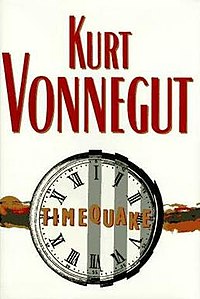Timequake
by Kurt Vonnegut
Vonnegut uses the premise of a timequake (or repetition of actions) in which there is no free will. The idea of determinism is explored—as it is in many of his previous works—to assert that people really have no free will. Kilgore Trout serves again as the main character, who the author declares as having died in 2001, at the fictitious Xanadu retreat in Rhode Island. Vonnegut explains in the beginning of the book that he was not satisfied with the original version of Timequake he wrote (or Timequake One). Taking parts of Timequake One and combining it with personal thoughts and anecdotes produced the finished product, so-called Timequake Two. Many of the anecdotes deal with Vonnegut's family, the death of loved ones, and people's last words.
The plot, while centered on Trout, is also a sort of ramble in which Vonnegut relays tangents to the plot and comes back dozens of pages later: the timequake has thrust citizens of the year 2001 back in time to 1991 to repeat every action they undertook during that time.
Most of the small stories in the book expound on the depression and sadness wrought by watching oneself make bad choices: people watch their parents die again, drive drunk or cause accidents that severely injure others. At the end of the timequake, when people resume control, they are depressed and gripped by ennui. Kilgore Trout is the only one not affected by the apathy, and thus helps revive others by telling them, "You were sick, but now you're well, and there's work to do."
In the conclusion of this book, Vonnegut (who has inserted himself into the text, something he also did in Breakfast of Champions and, to a lesser degree, in clambake," is heavily foreshadowed throughout the novel's previous chapters.
